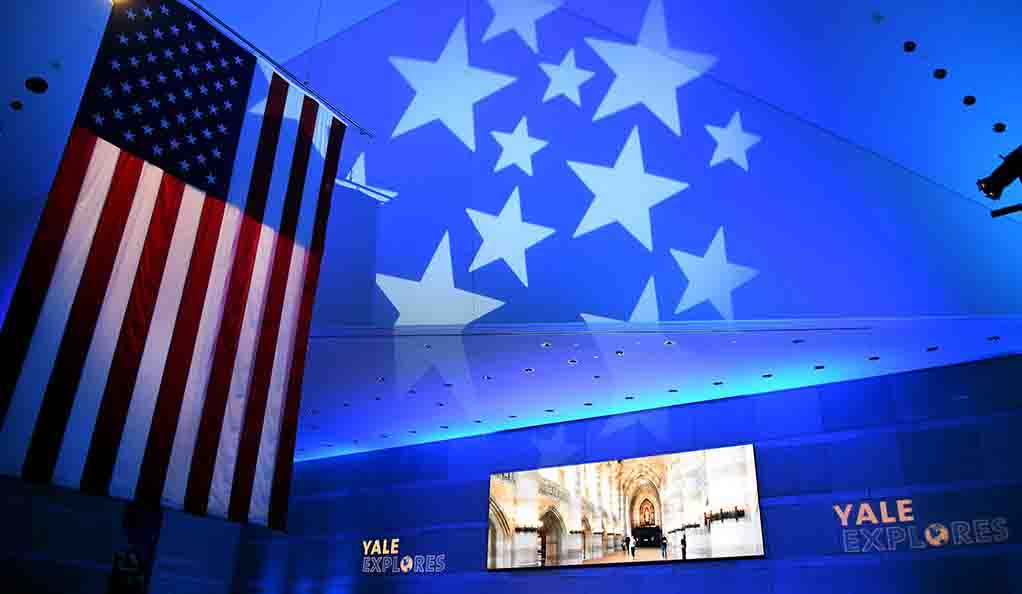
Courtesy of AMC Photography Studios
Yale alumni across the East Coast have gathered during October, over sushi and cocktails, to listen to a panel of Yale faculty discuss pressing scientific topics, and Yale’s role in advancing research in fields such as artificial intelligence.
The event series, called “Yale Explores,” brings the Yale community together “for an evening of connection and an interdisciplinary exploration of challenges facing our world,” according to the University website. At each event, members of the Yale faculty and University President Peter Salovey discuss issues like planetary health, cancer immunotherapies and cities of the 21st century. So far, Yale Explores meetings were held in Washington, D.C., Boston, Philadelphia and New York City. In March 2019, similar gatherings will be hosted in San Francisco and Los Angeles.
“[Yale Explores] is a way of bringing Yale alums and friends of Yale together, to both engage with each other and with the University,” said senior trustee Catharine Bond Hill GRD ’85, who opened the New York City event on Oct. 11. “I think people found the event interesting, exciting and impressive. When Yale alums are excited about what is going on at the University, it is good for Yale in a variety of ways, from increasing volunteering on behalf of the University to giving to the annual fund.”
Philosophy professor Shelly Kagan, who served as a panelist at the New York City event, said the gathering ran for around four hours and drew a crowd of about 1,200 alumni.
According to Vice President for Development Joan O’Neill, the results of the 2017 alumni survey conducted by the Association of Yale Alumni showed that all University graduates were interested in “lifelong learning.” Nearly half of the survey respondents wished to be more engaged with their alma mater and a majority wanted to see more Yale programming conducted in their area, O’Neill said. She added that Yale Explores was founded to “more broadly engage alumni outside of New Haven.”
O’Neill said the highlight of Yale Explores events is a panel discussion among two or three current faculty members moderated by a “prominent alum.” O’Neill added that after the panel, Salovey comments on the University’s role in advancing research related to the event’s topic.
According to O’Neill, the administration chooses the topics of the panel to represent “both critical challenges facing society and [those] in which Yale has particular and broad-based expertise.” Most of the previous Yale Explores events addressed issues in STEM-related fields. Eight of the 12 panelists form the past events hold professorships in these fields, such as computer science; chemical and biomedical engineering; and immunobiology.
In a statement in 2016, Salovey wrote that STEM was an investment priority for the University. He added that science performance was the differentiator between then-14th-ranked Yale and higher-ranking research universities worldwide.
In June, Yale released the University-wide Science Strategy Committee’s report, which identified top priorities for STEM investments in the coming years. However, the University is still in the process of raising the funds to transform the science fields at Yale.
“This strategic plan is roughly going to be a $100 million addition to expenditure on STEM at Yale,” University Provost Ben Polak told the News in September. “In fundraising terms, it’s equivalent to raising $2 billion … How are we going to get it done? I don’t have a clue. But we are going to get all of it done. We’re determined to get this done.”
In an interview with the News, Kagan said it “wouldn’t surprise [him] if there was a connection” between Yale Explores events and the University’s fundraising efforts. Kagan added that alumni events generally serve two purposes: allowing graduates to connect with each other and raising “a tremendous amount of money [needed] … to run an institution of the magnitude of Yale.”
O’Neill did not respond to questions about whether Yale Explores was part of the University’s fundraising efforts.
According to O’Neill, the University has heard great feedback from guests at each event. She added that many attendees requested that there be a “more formal way to engage” with faculty panelists after the scheduled programming, which prompted the University to create “conversation zones” where alumni and faculty can interact informally after the panel.
In an interview with the News, Ariel Murphy ’18, said that she decided to attend the event in New York City in part because of the low $15 ticket price. Though she said she didn’t learn much at the event, she added that it was “nice to connect with faculty, including Head of Silliman College Laurie Santos.”
The University entered the silent phase of its capital campaign in September.
Lorenzo Arvanitis | lorenzo.arvanitis@yale.edu
Serena Cho | serena.cho@yale.edu







